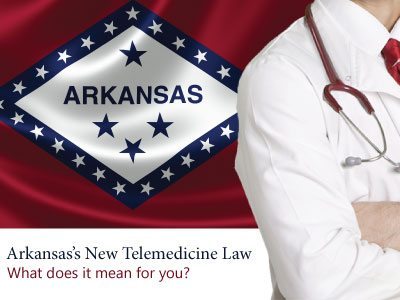
Arkansas Governor Hutchinson signed the Arkansas Telemedicine Law, Arkansas Act 887 to encourage the use of telemedicine and authorize reimbursement and regulation of services provided through telemedicine.
The new law goes into effect immediately; however, the parity provisions (Subchapter 16 of Arkansas Act 887) do not go into effect until on and after July 1, 2016 for Arkansas Medicaid and on and after January 1, 2016 for all other health benefit plans.
Here’s what the new law will mean to you:
- This is a new provision that affects the healthcare coverage for all medical professions when using telemedicine. All discipline-respective medical board terms on credentialing, licensing, practice, and other policies and recommendations apply.
- The new law requires health plans to cover telemedicine-provided physician services and reimburse physicians only on the same basis as in-person services.
- Physicians licensed by the board for healthcare services will be reimbursed by health benefit plans on the same basis as delivering such reimbursable care in person.
- Billing codes and protocol will be contingent upon each health plan’s policy and prescribed procedures; please consult each health plan to determine how to approach reimbursement.
- A patient must be located in a health provider’s office or other health care facility. The home is only permitted when the patient is receiving treatment for end-stage renal disease.
- Provider-patient relationships must be established according to the Arkansas State Medical Board rules before a telemedicine encounter except in emergencies or when providing non-patient-specific information of a generic nature.
- The definition of telemedicine is real-time audio-video when the patient is at an originating site and the provider is at a distant site; i.e. store and forward is not considered telemedicine under this legislation.
- Although the law does not create new requirements for patient informed consent, a provider must follow applicable state/federal laws related to informed consent, HIPAA, medical records and confidentiality, and fraud/waste/abuse.
- A provider must be fully licensed or certified to practice in Arkansas to treat patients who are located in Arkansas. Exemptions to this licensure/certification requirement include episodic consultation services.
The full details of the law can be found at https://legiscan.com/AR/bill/SB133/2015
Considerations prior to telemedicine engagement:
- Ensure your telemedicine network is HIPAA compliant.
- Ensure your telemedicine network provides reliable connections with sufficient bandwidth to support real-time interaction between the originating and distant sites to ensure the best quality of care.
- Arkansas e-Link is an existing statewide telemedicine network with nearly 400 member sites. For more information about Arkansas e-Link, please visit http://arkansaselink.com/
- The South Central Telehealth Resource Center (SCTRC) offers telemedicine training, expertise, and advice to providers and leaders in Arkansas, Mississippi, and Tennessee. For more information about the SCTRC, please visit https://learntelehealth.org/ or call 1-855-664-3450.
- The Center for Distance Health encourages new telemedicine users to take the online course “Telehealth 101” to learn more about telemedicine. To take “Telehealth 101,” please visit https://learntelehealth.org/courses/an-introduction-to-telehealth/overview-of-telehealth/
This fact sheet is brought to you by the University of Arkansas for Medical Sciences’ Center for Distance Health. Information in this sheet is based on Arkansas SB-133 https://legiscan.com/AR/bill/SB133/2015 and the American Telemedicine Association’s Legislative Fact Sheet http://www.americantelemed.org/news-landing/2015/04/08/arkansas-lawmakers-pass-telemedicine-payment-bill#.VSWIVpOVkb8.





